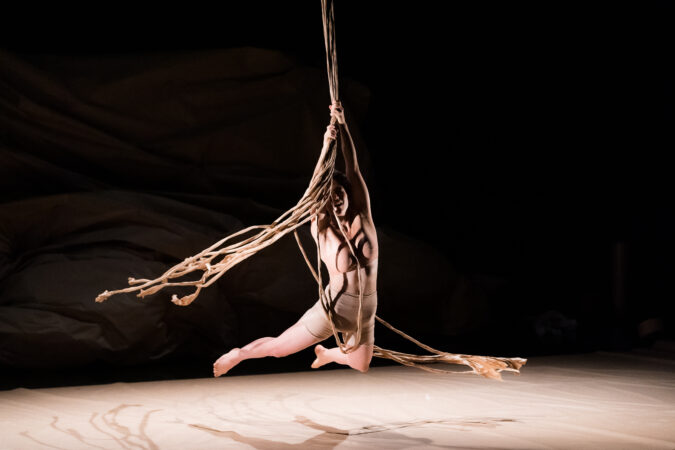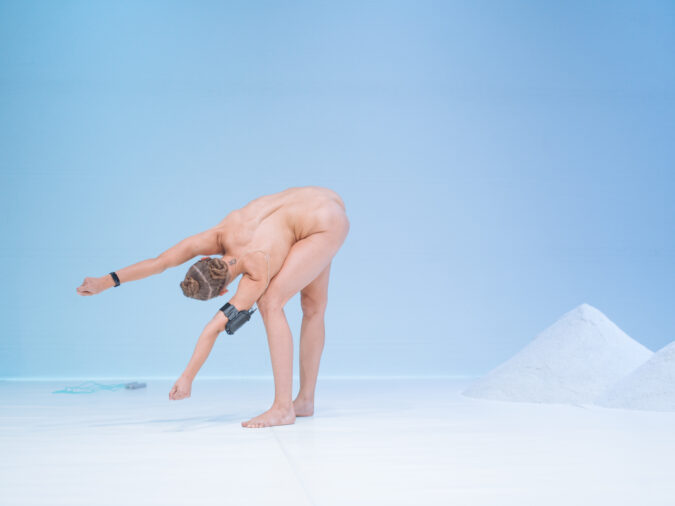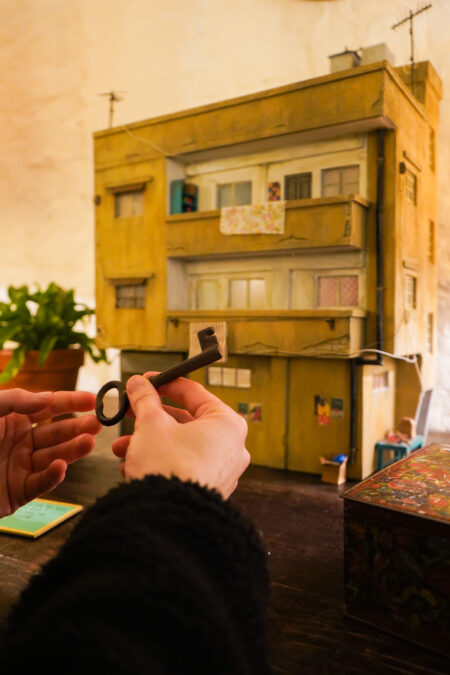Invoking an Alchemy of Transformation —a curatorial statement from Gabrielle Martin
November 22, 2023
The curation of this program draws inspiration from the linguistic root of “care” in “curate”, with a definition that encompasses self-reflection, responsiveness, and social accountability. It is also informed by my own sense of urgency, as humanity simultaneously converges realities of greater equality and liberation with fundamentalist regression and an accelerated entropy induced by capitalism.
The artistic projects of the 2024 PuSh program are all works that share a sense of cultural urgency. They are works that inspire social change through their what – through content that pushes us to examine contemporary issues and how we situate ourselves in relation to them:
NOUS Théâtre’s L’amour telle une cathédrale ensevelie examines the familial impacts of migration from “forsaken” towards “promised” lands; Back to Back Theatre’s The Shadow Whose Prey the Hunter Becomes speculates on how AI will treat humans given society’s treatment of people who are neurodivergent; and Nellie Gossen’s Returns investigates modern production and consumption over the course of a 30-day return cycle.

They are works that centre the why – making us feel more alive with personal accounts of resistance and acts of vulnerability in conversation with liberation and mortality. Aerial acrobatics and paper sculpture meet in Pli, by Inbal Ben Haim, Domitille Martin and Alvaro Valdes, evoking fragility and “a different kind of strength”. In Theatre Passe Muraille’s Sound of the Beast, Donna-Michelle St. Bernard reflects on how we are connected to the systems that oppress us, and how we can empower each other to rise up. And the cathartic treatment of death by Soho Theatre’s Lorenzo elicits an emotional range that only a comedian can achieve.

The Festival is also defined by works whose creative risk and interdisciplinarity shift our paradigms for expression, or the how: the dynamic, immersive environment of mirrors, music and video imagery in Theatre Conspiracy’s Same Difference invites us to encounter ourselves in a whole new way through the dynamic, immersive environment of mirrors, music and video; in Action at a Distance and Tangaj Collective’s BLOT – Body Line of Thought, dancers share the stage with bodies of salt and broadcast imagery of their own microbe cultures for a dialogue about nature, affecting, and being affected; and in asses.masses, Patrick Blenkarn and Milton Lim cross game design and performance to create a participatory hybrid of gameful performance that challenges what “democratic” means in the context of theatre.


Grounded in this sacred trinity of society, self, and form, the 19th Festival edition is set to invoke an alchemy of transformation. Together, the works present a cultural strategy for a diversity that welcomes generative friction, and the development of narratives that honour the honest complexity of our collective nature. This is beautifully realized in works like Human Cargo’s The Runner, which questions what happens to us when we are pushed to our spiritual, moral and emotional limits; Basel Zaraa’s Dear Laila and its exploration of how war and exile are experienced through the everyday, and domestic and public spaces; Rakesh Sukesh’s because i love the diversity (this micro-attitude, we all have it) and its ability to embody the chaos of an unjust society and find humour in the contradictions; and Jean Abreu and Naishi Wang’s Deciphers — a physical translation of the evolving nature of human identity.
PuSh 2024 offers a means to rethink our histories and imagine possible futures with several works: Ramanenjana, by Simona Deaconescu and Gaby Saranouffi, takes the dance “epidemic” of 19th century Madagascar as a site for inquiry into the role of dance as public manifestation; and Adam Tendler’s Inheritances is a legacy in and of itself, conjuring reflections on what we leave behind when we move on; Cherish Menzo’s DARKMATTER takes us from post-humanism to Afro-futurism, asking how we speculate about the Black body in the future; and in NOMADA, Diana Lopez Soto creates a world where the fragile balance of the earth is restored through acts of renewal.
Collectively, these visionary and experimental projects form a ritual for social change that can only be activated by your participation. I hope to see you there.
—Gabrielle Martin, Director of Programming
Photos:
The Shadow Whose Prey the Hunter Becomes, Photo: Jess Busby
Pli, Photo: Loïc Nys
BLOT, Photo: Adi Bulboacå
Dear Laila, Photo: Mohab Mohamed